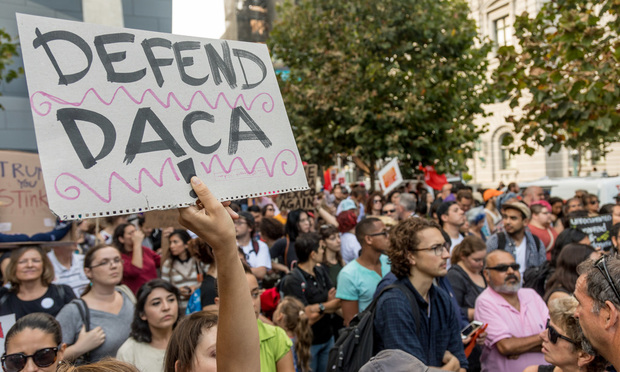Ninth Circuit Upholds Injunction Against DACA Rollback
"The government may not simultaneously both assert that its actions are legally compelled, based on its interpretation of the law, and avoid review of that assertion by the judicial branch, whose 'province and duty' it is 'to say what the law is,'" wrote Ninth Circuit Judge Kim Wardlaw, quoting from Marbury v. Madison.
November 08, 2018 at 01:39 PM
4 minute read
 Thousands of protesters spill onto 7th Street in San Francisco after President Donald Trump announced ending the Obama-era Deferred Action for Childhood Arrivals program. (Photo: Jason Doiy/ALM)
Thousands of protesters spill onto 7th Street in San Francisco after President Donald Trump announced ending the Obama-era Deferred Action for Childhood Arrivals program. (Photo: Jason Doiy/ALM)
The U.S. Court of Appeals for the Ninth Circuit on Thursday upheld a lower court's preliminary injunction blocking the federal government's rollback the Deferred Action for Childhood Arrivals (DACA) program.
In a 99-page opinion, Judge Kim Wardlaw wrote that Department of Homeland Security Secretary Kristjen Nielsen was “incorrect in her belief that DACA was illegal and had to be rescinded.”
Wardlaw also turned back the administration's conclusion that its decision DACA was illegal was not reviewable by the courts. “The government may not simultaneously both assert that its actions are legally compelled, based on its interpretation of the law, and avoid review of that assertion by the judicial branch, whose 'province and duty' it is 'to say what the law is,'” she wrote, quoting from Marbury v. Madison.
The Ninth Circuit ruling upholds a preliminary injunction from U.S. District Judge William Alsup of the Northern District of California, who blocked the Trump administration's decision to roll back DACA. The DACA program temporarily exempts certain undocumented immigrants brought to the U.S. as children from deportation.
Jeffrey Davidson, a Covington & Burling partner who argued the case on behalf of The Regents of the University of California and university president Janet Napolitano, says the decision “sets a terrific tone” for other cases over DACA recission.
“Our main allegation in this case is the government failed to give any consideration to the interest of the DACA recipients when it rescinded DACA, and that the decision was based on an error of law and was inadequately explained,” Davidson said. “And these are all very sort of common-sense aspects of government decision making.”
Gibson, Dunn & Crutcher partner Ethan Dettmer, whose firm represented a group of individual DACA recipients, said in an email statement this his clients “embody the American Dream.” Wardlaw opens her opinion with a description of Gibson's client Dulce Garcia, who was brought to the U.S. by her parents as a 4-year-old, and who now serves as a lawyer for underserved communities.
“In upholding Judge Alsup's preliminary injunction, the Court recognized that Dreamers are 'no different from any other productive—indeed inspiring—young American,' and that DACA was put in place to prevent 'the cruelty and wastefulness of deporting productive young people to countries with which they have no ties,'” Dettmer said. “Today's order is a victory for the rule of law that allows DACA holders to continue to renew their DACA status.”
Other law firms representing plaintiffs include Cotchett Pitre & McCarthy and Altshuler Berzon. Among the slew of big law firms that filed amicus briefs with the Ninth Circuit were Davis Wright Tremaine, Jenner & Block, Mayer Brown, Fenwick & West, Boies Schiller Flexner, Steptoe & Johnson, and Venable LLP, and Cooley.
The Ninth Circuit decision comes days after the Department of Justice petitioned the U.S. Supreme Court to weigh in on the future of DACA recipients. The move followed a letter sent to the Ninth Circuit by the DOJ imposing an Oct. 31 deadline to rule on the DACA case, stating that failure to meet the deadline would lead to a “petition to the Supreme Court for a writ of certiorari.”
Covington's Davidson noted that given Thursday's Ninth Circuit decision, the Supreme Court decision “no longer makes any sense.”
“It seems to me there ought to be new proceedings to decide whether and how the Supreme Court should address this case,” he added.
Read the full opinion below:




